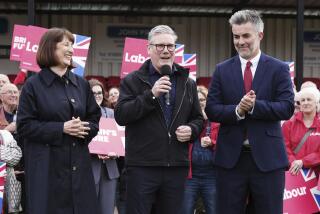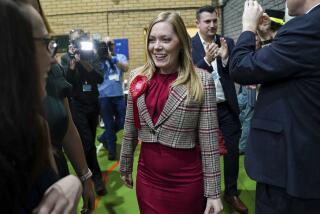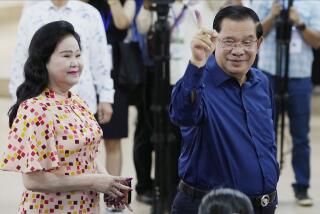Liberals Win in Landslide in Hong Kong Voting : Southeast Asia: Results indicate desire for rapid political reforms in the British colony China is to take over in 1997. But turnout is only 39%.
- Share via
HONG KONG — Liberal candidates advocating rapid political reforms in this British colony and in China won a landslide victory in a key legislative election here Sunday.
The people of Hong Kong sent a mixed message, however, concerning their demand for greater democracy, with only 39% of the 1.9 million registered voters casting ballots. The poor turnout was a major disappointment to those who had hoped the election results could be used to pressure China and Britain into faster steps toward democratization here before Beijing’s scheduled 1997 resumption of sovereignty over Hong Kong.
Candidates from the leading organization of pro-democracy activists, the United Democrats of Hong Kong, or from associated liberal parties, won 15 out of the 18 seats up for election Sunday. No seats went to the conservative, pro-business Liberal Democratic Federation, which advocates a non-confrontational approach toward relations with China, or to openly pro-Beijing candidates. Three independent candidates, all viewed either as moderates or liberals, also won.
Martin Lee, leader of the United Democrats, who won a seat by a wide margin, scheduled a victory press conference for this afternoon at which he was expected to discuss how the liberal parties intend to press for further political reform in Hong Kong.
“The results show that very clearly, the (United Democrats party) represents the people of Hong Kong--that its views represent the views of the people of Hong Kong,” Tom Boasberg, an assistant to Lee and a spokesman for his party, said this morning.
“I think this will greatly strengthen our call for democracy in Hong Kong.”
The results show that Hong Kong voters favor “democracy even at the expense of more confrontational relations with China,” Boasberg said.
Sunday’s vote was the first in the colony’s 150-year history in which people here could directly choose some of their legislative representatives. In addition to the 18 directly elected seats filled by Sunday’s election, the 60-member Legislative Council has 21 seats filled last week through voting by members of selected occupational groups in what are called “functional constituencies,” and 21 seats that go to appointed members and top civil servants.
The council plays a largely advisory role in the Hong Kong government, with real power held by the British governor, the Executive Council (whose members are all appointed) and the government bureaucracy.
Under the formula “one country, two systems” expressed in the 1984 Sino-British agreement on China’s 1997 resumption of sovereignty, Beijing has promised that Hong Kong can retain its capitalist economy and civil liberties for at least 50 years. It also has promised Hong Kong a “high degree of autonomy” but not full self-rule. After 1997, Beijing will appoint Hong Kong’s governor.
The number of directly elected Legislative Council seats is due to be increased to 20 in a 1995 election, but there is no guarantee of further democratization after that.
The Beijing-controlled China News Service warned Hong Kong voters in a recent commentary that failure to elect people with “a high degree of political wisdom” could undermine Hong Kong’s stability and prosperity. “Apart from considering the political platform of each candidate, their personal conduct, past experience and competence, (voters) should also take into consideration the attitude of each candidate towards Hong Kong’s relationship with the mainland,” the commentary warned.
The commentary was seen as a clear attack on the United Democrats and liberal candidates, but voters chose to ignore its warning.
Tik Chi-yuen, a winning candidate from the liberal organization Meeting Point, said he expects to cooperate closely with legislators from the United Democrats. “We are all working for the same goal--to be the voice of the people,” Tik said.
Leung Kwan-kwok, a social science lecturer at City Polytechnic, commented that the low voter turnout “reflects that Hong Kong is basically an apolitical society.”
More to Read
Sign up for Essential California
The most important California stories and recommendations in your inbox every morning.
You may occasionally receive promotional content from the Los Angeles Times.












